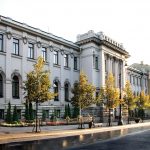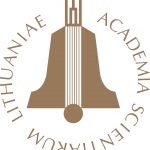
Lithuania – Lithuanian Academy of Sciences
02 11 2016
The Lithuanian Academy of Sciences (LAS) was founded on January 16, 1941. In its activities, the Lithuanian Academy of Sciences is guided by its Charter ratified by the Seimas of the Republic of Lithuania and other legal acts. The Lithuanian Academy of Sciences is a budgetary institution that brings together the most distinguished Lithuanian scientists and foreign scientists whose academic activities are related to Lithuania. The LAS is an independent expert and consultant of the Seimas, the Government and its agencies on research and higher education, culture, social development, economy, environmental protection, health care, technology, and other issues.
The Academy is implementing collaboration agreements with 26 foreign academies and other research centres; together with its partners, it carries out projects financed by the EU Structural Funds important for Lithuania’s R&D. The LAS is the founder of the Wróblewski Library; it publishes research proceedings, academic journals, and informational publications. The Academy often plays host to national and international conferences, seminars by foreign scientists, scientists’ meetings, academic readings, and exhibitions. On the assignment of the Government, the LAS organizes the activities of the Lithuanian Commission for Science Prizes; it has established 18 commemorative science prizes; it encourages young scientists and students to engage in scientific research by awarding each year 10 prizes to young scientists and 15 prizes to university students. Since 2010, the Academy has been giving 15 annual grants to young researchers.
According to its Charter, the LAS has the right to elect 120 full members (under 75 years of age) by open competition. The number of emeriti (over 75 years of age) and foreign members is not limited.
The Division of Agricultural and Forestry Sciences
In 1991, an independent Section of Agricultural Sciences was set up in the Division of Biology, Medicine and Agriculture, and in 1995 it was reorganized into the Division of Agricultural and Forestry Sciences. For two terms, the newly founded Division was chaired by Veronika Vasiliauskienė. Its activities are conducted in 5 sections and 4 commissions.
The Division has always been concerned about increasing the role of agricultural and forestry sciences in the solution of scientific and economic problems in this country. It initiated the establishment of the Nemunas Science, Studies and Business Centre (Valley). The members of the Division have carried out important research in many spheres: Leonardas Kairiūkštis has given a theoretical substantiation of stand productivity; Stasys Karazija has originated Lithuanian forest typology; Remigijus Ozolinčius has started forest condition assessment; and Algirdas Sliesaravičius has undertaken plant biotechnology studies. The following scientific schools and trends have been created: grassland husbandry – Leonas Kadžiulis; plant pathology – Mindaugas Strukčinskas; genetics and biotechnology, later oil-bearing plant biotechnology – Algirdas Sliesaravičius; plant protection – Zenonas Dabkevičius; original orchard plant genetics and biotechnology – Vidmantas Stanys; theoretical basis of livestock productivity – Česlovas Jukna; research into the use of enzymes in animal and poultry nutrition – Vytautas Konstantinas Sirvydis; improving livestock reproduction properties – Henrikas Žilinskas, soil science – Algirdas Juozas Motuzas, energy and material exchange processes in biotechnology – Algirdas Jonas Raila, plant physiology – Pavelas Duchovskis, water management – Arvydas Povilaitis, food technology – Pranas Viškelis, agriculture and forest plant breeding – Vytautas Ruzgas and Darius Danusevičius.
The first State scientific project “The Ecological Sustainability of Regional Development” (ECOSLIT) was implemented and the monograph “Lithuania’s Ecological Sustainability in the Historical Context” was published under the supervision of Leonardas Kairiūkštis. It was followed by other important studies: “Lithuania’s Soils”, “Biotechnology of Agricultural Plants”, “Plant Product Stationary Drying of Thick Layers”, and “Dictionary of Agricultural Terms for Plant Breeding and Seed Production”.
For their outstanding scientific achievements Vidmantas Stanys, Algirdas Sliesaravičius, Leonardas Kairiūkštis, Remigijus Ozolinčius, Zenonas Dabkevičius, Darius Danusevičius, Alfas Pliūra, Vytautas Ruzgas were awarded the National Science Prizes. Leonardas Kairiūkštis’s valuable contribution to the European forestry earned him the international Wilhelm Leopold Pfeil Prize. Four members of division: Leonardas Kairiūkštis, Albinas Kusta, Henrikas Žilinskas and Zenonas Dabkevičius are the Foreign fellows of the Royal Swedish Academy of Agriculture and Forestry.
Some members of the Division used to hold or hold now important posts at scientific, educational and other institutions. Zenonas Dabkevičius is the Director of the Centre of Agrarian and Forestry Sciences; Henrikas Žilinskas is the Chancellor of the Veterinary Academy and Antanas Sederavičius – the Vice-Rector of the Lithuanian University of Health Sciences. Leonas Kadžiulis was appointed the Minister without portfolio and the Chairman of the Science Council of Lithuania. Antanas Kairys was elected to the Seimas (Parliament) of the Republic of Lithuania; Vidmantas Bižokas was the Rector of the Lithuanian Veterinary Academy, and Albinas Kusta served as the Rector of the Lithuanian University of Agriculture, Remigijus Ozolinčius was the Director of the Lithuanian Forest Research Institute.
09/23/2016

